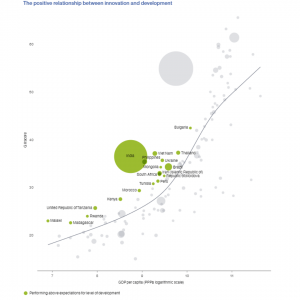What is the state of innovation throughout the past year? How can one actually measure innovation and which are the best performing innovation regions and economies in the world? The 14th edition of the Global Innovation Index 2021 was published this week to show the annual innovation performance of 132 economies around the world. It also reveals the impact of COVID on innovation sectors. In addition to tracking the innovation ecosystem performance and tracking the most recent global innovation trends, this year’s report includes a Global Innovation Tracker. The tool measures whether the pandemic has slowed or accelerated innovation and how COVID-19 changed the rate of technological progress.
Released under the theme “Tracking Innovation through the COVID-19 Crisis”, the report is published by the World Intellectual Property Organization (WIPO) in partnership with many global organizations such as the World Bank, the World Economic Forum, the Global Entrepreneurship Monitor, and the International Monetary Fund.
So, who is leading the ranks in innovation? Switzerland is ranked as the most innovative country in 2021, followed by Sweden, the US, the UK, and the Republic of Korea. When it comes to the best performing innovation economies by income group, the report indicates that Bulgaria is the second in the world among all upper-middle-income countries, after China. In absolute terms, Bulgaria is ranked in 35th place, a little above Greece (47th) and Romania (48th).
How do you measure innovation progress
The report highlights that even though investments in innovation had reached an all-time high before the pandemic, in 2020 scientific output, R&D expenditure, IP filling, and venture capital deals continue to increase. Worldwide, publications of scientific articles grew by nearly 8%, and the top global corporations grew their R&D expenditure by around 10%, while international patent filings reached an all-time high. The increase was mainly driven by innovations in medical technology, pharmaceuticals, and biotechnology.
Europe is still ranked as the second most innovative region in the world, after North America, with 16 European economies being in the top 25 innovation leaders in the ranking. When it comes to the GII score of countries relative to their GDP per capita, Bulgaria leads the ranks by being the country with the best innovation performance compared to its level of development.

But how does the Index actually measure innovation to create an accurate ranking? The Global Innovation Index report follows an interesting methodology that combines sub-variables from two major groups – innovation input sub-index and innovation output sub-index.
In simple terms, the innovation output measures the creation, impact, and diffusion of knowledge and technology, as well as the development of creative intangible assets. On the other hand, the input sub-index tackles trends from the macro environment such as the effectiveness of institutions in providing innovators with proper political, regulatory, and business environment, the state of human capital and research, the level of infrastructural development, as well as the levels of market and business sophistication.
Bulgaria on the innovation spotlight
Numbers are impactful indicators of development, but what stays behind them is even more insightful. The sub-index where Bulgaria scores highest is Creative outputs which means that the intangible assets developed locally such as trademarks, global brand value, industrial designs, and organizational model creation are considered to be highly innovative. The same goes for the development of creative goods and services such as cultural, entertainment, and media services, and the development of mobile apps and other forms of online creativity.
The country also scores high in knowledge and technology outputs, especially in terms of the creation of patents, utility models, scientific and technical articles, and developments in high-tech manufacturing. The ability of local innovation leaders to create innovation linkages is also highlighted as a key strength of the economy and this is represented by the high number of concluded joint venture and strategic alliance deals.
The weaknesses of the local innovation economy are mainly related to the underdeveloped market infrastructure which negatively affects the ease of businesses to receive credit, the amounts of domestic credit to the private sector, and the number of microfinance loans for starting ventures. The same negative statistics are seen also when it comes to the number of global corporate R&D investors in the country as none of the top three global companies by R&D expenditure are present in Bulgaria.







